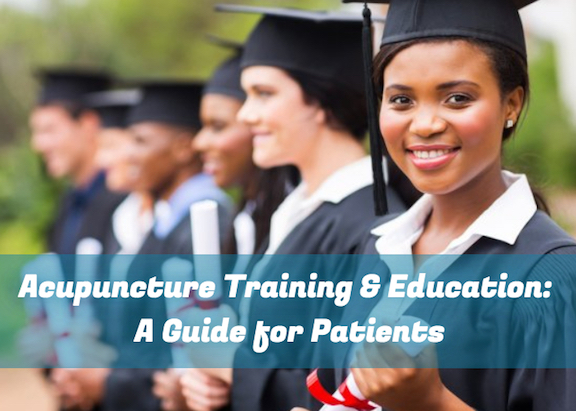Acupuncture as a profession requires a lot of discipline, responsibility, and most importantly, education. The latter may come as a surprise to some, especially those not as familiar with the ancient practice of acupuncture, but like other healthcare professions, becoming a licensed acupuncturist requires a lot of education, time and effort. Unlike some holistic practices that only require a certification, becoming a licensed acupuncturist requires many hours of schooling along with potentially several degrees, and additional certifications needed for licensing or areas of interest. According to the Council of Colleges of Acupuncture and Oriental Medicine (CCAOM), there are 1.35 Million more Americans receiving acupuncture since 2002, and with that being said, it is important that we understand both what to look for, and what it takes to become a licensed acupuncturist as it is much more than many probably had imagined.
Acupuncturist Training
Acupuncture, the ancient Chinese medical practice in which hair-thin sterile needles are used to stimulate points all over the body, requires a specific skillset as well as an understanding of biology, and how the body moves and operates. A licensed acupuncturist can have an independent practice or be part of an integrative group alongside other acupuncturists or providers of Western medicine.
A person trying to become a licensed acupuncturist in the United States can study acupuncture at a school accredited by the Accreditation Commission for Acupuncture and Oriental Medicine (ACAOM) which is recognized by the US Department of Education. Accredited acupuncture schools require that a student first complete at least two years of study at the baccalaureate level, however, most acupuncture schools require a full 4-year bachelor’s degree before being accepted into the program.
An acupuncture curriculum typically consists of:
- 3,035 hours of acupuncture and herbology for national board certification
- 1,410 hours of specific acupuncture training
It takes anywhere from 3 to 4 years to earn acupuncture accreditation depending on the program. Not to mention potentially additional schooling for a doctorate or specific postgraduate certifications in things like veterinary, pediatric, cupping, or electroacupuncture.
Additional credentials some acupuncture providers seek after obtaining their initial acupuncture accreditation may include:
- Fertility (FABORM)
- Chinese Herbalist (C.H.)
- Fellow American Board of Animal Acupuncture (FABAA)
- Asian Bodywork Therapist (ABT)
Additionally, some acupuncture students may opt for the study abroad option which enables them to study in China with the best Chinese medicine hospitals in order to gain an in-depth understanding of techniques and principles from top experts in the field – getting to the roots of acupuncture. As a part of their degree program, acupuncturists are required to complete a variety of course work in acupuncture topics.
Courses typically seen in acupuncture programs include:
- Oriental medical theory
- Diagnosis (pulse, tongue, and traditional Chinese medicine) and treatment technique
- Oriental herbal studies
- Biomedical clinical sciences
- Anatomy and physiology
- Practice management
- Nutrition
- Ethics
- Needle technique
- Acupuncture point location/channels
- Western medicine
- Asian bodywork
- Cupping (pulling blood to the surface of the skin using evacuated cups)
- Acupressure Techniques
There are multiple other distinctions that licensed acupuncturists may have in their resume, and you can find a full list here. It is important to understand the credentialing distinctions when looking for a licensed acupuncturist, and know that they have the proper training. Once successfully completing an acupuncture program, the acupuncturist will have a master’s degree, which is the minimum requirement for states in the U.S. to practice acupuncture.
Types of acupuncture degrees:
- Master of Science in Oriental Medicine (MSOM)
- Masters of Acupuncture and Oriental Medicine
(MAcOM)
- Master of Traditional Chinese Medicine (MSTCM)
- Master of Traditional Oriental Medicine (MTOM)
- Doctorate of Acupuncture & Chinese Medicine
(DACM)
- Doctor of Acupuncture and Oriental Medicine
(DAOM)
- Doctor of Oriental Medicine (DOM)
Acupuncture Licensing Requirements
Going to an accredited acupuncture school is not the end of the journey to becoming a licensed acupuncturist. In the United States, all but 3 states require acupuncturists to obtain a license to practice. This means that for all other states, acupuncturists will be required to complete examinations before beginning a practice.
Licensing requirements (depending on the state):
- National Certification Commission for Acupuncture and Oriental Medicine (NCCAOM) examinations (they administer the national board examinations for the profession)
- NCCAOM certification program
- California licensing examinations (this particular state has its own certification program apart from NCCAOM)
- State licensing exam
In addition to these, each state may also have unique requirements for licensure. To become a recognized licensed acupuncturist by the NCCAOM, there are a laundry list of requirements.
NCCAOM requirements for certification:
- Graduate from an ACAOM accredited program (currently 47 ACAOM approved schools in the U.S.)
- Complete a Clean Needle Technique course offered by the Council of Colleges of Acupuncture and Oriental Medicine (CCOAM)
- Pass certification exams in the foundations of oriental medicine, acupuncture, and biomedicine.
Each state defines the scope of what a licensed acupuncturist must do to practice acupuncture. An acupuncturist who is licensed in one state, just like other medical practices, would most likely need an additional license to practice in a different state. Of the 47 U.S. states plus the District of Columbia that require licensure, all additionally require the NCCAOM certification or the passing of the NCCAOM examinations as a requirement for licensure. California is currently the only state that gives its own licensure examination.
Is Acupuncture Worth a Try?
More and more it seems that acupuncture is being incorporated into care teams alongside western medical practitioners to deliver care to patients. This is especially true in light of the opioid crisis in the United States, where many Americans are looking for a natural, less harmful alternative to prescription medications.
Acupuncture works for:
- Nausea and vomiting
- Anxiety
- Depression
- Headaches
- Back pain (low back pain, upper back pain, and middle back pain)
- Neck pain
- Allergies
- Menstrual cramps
- Arthritis
- Insomnia
- And much more!
This list could go on and on. In fact, according to the Council of Colleges of Acupuncture and Oriental Medicine (CCAOM), there are greater than 43 diseases, conditions, and symptoms recognized for acupuncture by the World Health Organization (WHO). Those are just ones recognized, but there are many conditions that acupuncture works for.
The question of “Is it worth it?” from everything already discussed in this article, acupuncture is absolutely worth looking into. Education, training and licensure are what to look for as a patient. Just like others in the medical profession, there is an extensive amount of schooling and training that is required to obtain a license to practice. At least a masters level education on top of clinical hours, and multiple certifications & exams – acupuncture as a medical profession is the real deal.
Cost is another thing people often question when it comes to acupuncture. While the national average cost of acupuncture visits are around $75, this is a reasonable, and low-cost treatment option in comparison to western medical care. If we take a condition like diabetes, for example, you may very well need to see not only your physician, but a podiatrist as well, amongst other specialists that may come up as the condition progresses. Not to mention the cost of medication should you need it for your condition. Going along with this example, insurance costs are what really need to be looked at closer.
Common costs at a western medical doctor or specialist visit:
- Copay (for a specialist can be upwards of $75
alone)
- Coinsurance (this is the percentage determined
by your insurance that you are responsible for on the visit)
- Deductible (this is the amount that needs to be met before the insurance will pick up and pay)
This means that you could be paying $75 (or more) for each of those doctors, multiple times a month.
There are many insurance plans that do cover acupuncture now, and somewhat surprisingly, a lot of them cover 100% as well. Western medicine is really catching onto the benefits of acupuncture treating many conditions at once in a holistic manner. If you don’t have acupuncture coverage under your plan, it is infinitely less expensive than western medical care. Being that acupuncture treats a multitude of conditions at the same time, the cost is very low, and completely worth it in the hands of well-trained licensed acupuncturists.
Acupuncture Treatment
Licensed acupuncturists, as we have now seen, are qualified, educated medical professionals, and have earned their well-deserved place to provide healthcare for millions of Americans. Now that there is some insight into the behind-the-scenes requirements of becoming a licensed acupuncturist, not only will you know what to look for when seeking acupuncture treatment, but you will also feel reassured when you find these credentials in association with your acupuncturist, that you’re in good hands.
There are currently 37,800 Oriental Medicine practitioners in the United States. Find an acupuncture provider with Best Acupuncture Near Me today!

Acupuncture Near Me
Get acupuncture near you today with Best Acupuncture Near Me, and contact a local acupuncture practitioner to find out if acupuncture is right for you.

